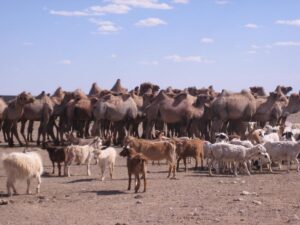Parshas Vayishlach
It’s Time To Smell The Coffee!
“Rescue me, I pray, from the hand of my brother, from the hand of Esav.” (Bereishis 32:12)
After many years of staying with Lavan, Yaakov was finally preparing to return home. He heard that Esav was coming to “greet” him together with an army of 400 men. Yaakov was concerned. He davened to Hashem. “Rescue me, I pray, from the hand of my brother, from the hand of Esav.” (Bereishis 32:12)
The commentaries are bothered by the apparent redundancy in Yaakov’s prayer to Hashem. Yaakov only had one brother. It was obvious that he was asking Hashem to save him from Esav. Why did he feel it necessary to add, please save me from my brother, from Esav?
Rashi answers that Yaakov was asking Hashem to save him from the hands of his brother who was not acting as a brother should. Rather, he was acting wickedly.
The Beis HaLevi gives another answer. He says that after hearing that Esav was on his way to meet him, Yaakov understood that Esav had one of two intentions. Either Esav wanted to fight against Yaakov, intending to kill him. Or Esav wanted to make peace and live together in harmony. Yaakov feared both possibilities! Obviously, Yaakov did not want Esav to kill him. However, he was also afraid that Esav would show him brotherly love and befriend him.
In fact, Yaakov’s first prayer was to be saved from “my brother”. Only then did he ask Hashem to be saved from “Esav”. The Bais HaLevi explains that Yaakov was even MORE afraid of the danger of living in harmony with the evil Esav, than the danger of being killed by Esav!! Had Esav attempted to kill Yaakov, that would have been a physical assault. Living in peace with Esav would constitute a spiritual assault. Yaakov was very concerned, lest he be influenced by Esav’s evil deeds, even to a small extent.
As the parsha unfolds, we see that Hashem accepted both aspects of Yaakov’s tefillah. Esav had intended to kill Yaakov. Hashem caused Esav to change his mind, thus saving Yaakov’s life. After Yaakov had appeased Esav with a large gift, Esav wanted to spend time with Yaakov and travel together with him. Hashem also saved Yaakov from being with Esav for even 1 full day; Esav accepted Yaakov’s refusal to go with him.
Yaakov’s experience with Esav portends to the experiences of the Jewish People at the hands of Esav’s descendants, the Roman Empire and the Western World.
First, they try to destroy us by intense persecution, symbolizing the “evil Esav”. They make harsh decrees, attempt to forcibly convert, torture, and kill us. Hashem does not permit them to annihilate us. When Esav’s descendants realize that this method does not work, they try a different approach. They behave like “my brother Esav”, showering us with friendship and brotherhood. They express a desire to live in peace and harmony with us, promoting close associations with us. Although their faces show friendship, their hearts still harbor hate. Their goal remains the same. They want to weaken our attachment to Torah. Yaakov feared this second approach, more so. Since it is disguised as friendship, it is less likely to be met with resistance. Therefore, it is more dangerous to us.
Currently, we are experiencing the face of “my brother”, Esav. There are numerous, “friendly” attacks on us, looking to distance us from the Torah. Even if we remain steadfast and loyal to the Torah, we are still in danger. There are so many subtle influences that can have an impact on a Torah Jew, without our even realizing it. There are influences of advertisements and commercials, the media, as well as proximity to co-workers with different values and goals in life. We are influenced as to what to read, how to dress, where to go on vacations, and how to spend our leisure time.
We are influenced by our environment. Sometimes the influence is so subtle that we gradually change without realizing. May Hashem always help us realize that we are different, with higher goals and values. May Hashem save us from the “evil Esav”. May Hashem also insulate us from the face of “my brother Esav”, who constantly tries to distance us from Hashem and from the Torah.





